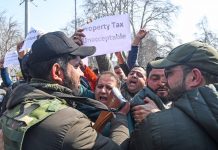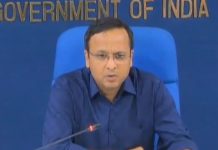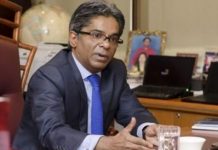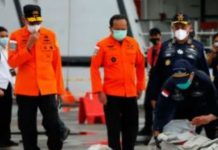However, the absence of a boycott call does not guarantee a high voter turnout in the Valley as the poll boycott has become a default response among a significant section of people, particularly in urban areas. The over three-decade old habit may not go away easily. A report by Riyaz Wani
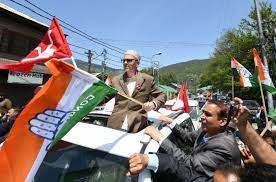
The ongoing parliamentary elections in Jammu and Kashmir are witnessing a notable omission: there has been no call for a boycott of the exercise from any quarters. This marks a significant departure from the norm established since the beginning of the separatist struggle in 1989.
Kashmir’s chief cleric and Hurriyat chairman Mirwaiz Umar Farooq – the only major separatist who is now out of jail but often confined to his home – has refrained from issuing a boycott call for the elections, unlike in the past.
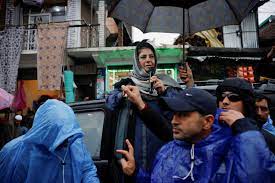
“The government of India made drastic unilateral changes and complicated the dynamics of the Kashmir issue in 2019. In the changed circumstances, issuing a boycott call does not seem to carry the sense or yield the impact like in the past,” he said in a recent statement.
He also clarified the Hurriyat’s stance on elections, saying it never had reservations about the idea of elections.
“Constituents of the united Hurriyat did participate in elections held before 1990,” he said while reiterating his objections to the “misrepresentation” of these elections by the government of India in the context of the Kashmir conflict.
However, the absence of a boycott call does not guarantee a high voter turnout in the Valley elections. The reason is that the poll boycott has become a default response among a significant section of people, particularly in urban areas. It is an over three decade old habit which may not go away easily.
Since the early nineties, separatists have championed the boycott of elections, although this trend has seen diminishing returns over the years. The urban areas still witness significant boycotts but the rural areas generally experience higher voter turnout.
The question now arises whether people in cities and towns will vote in large numbers in the absence of a public boycott call. Many may still choose to boycott, driven by emotions or a belief that casting a vote is a betrayal of the Kashmir cause.
Moreover, generations of people in the Valley have grown up boycotting elections, and the culture is so deeply entrenched that it may be hard to shake it off, particularly in urban areas. The exercise remains deeply stigmatized for many, and others simply have no prior experience of voting.
Fallout on outcome of polls
Election boycotts have often profoundly impacted the electoral exercise in the Valley. There exists a dormant separatist voter base that, if mobilized, could significantly favour a candidate with a strong pro-Kashmir stance. However, if this constituency chooses to abstain from voting, the outcome becomes unpredictable. In such a scenario, even a candidate with little political influence could secure victory. Over the past three decades, there have been numerous instances where candidates with minimal support won elections by narrow margins, subsequently assuming prominent government positions. Should the anticipated voluntary boycott occur, this precedent might very well repeat itself.
The outcome of the ongoing exercise could be determined by the percentage of people who choose not to vote. If there is a wider boycott, the result could be distorted, potentially favouring an unpopular candidate.
Debate over boycott
The debate about whether boycotting elections by the separatists was the right strategy is not new and has been discussed within separatist ranks for years but without a resolution. While moderate separatists, such as Mirwaiz Umar Farooq, have often chosen to distance themselves from the electoral exercise, hardliners have continued to advocate for a boycott.
The upcoming election will be crucial for cities like Srinagar, which have consistently boycotted polls since 1987 Assembly polls which were widely perceived to have been rigged. The city has been in a limbo ever since. Though there has been an occasional furtive urge to re-assert its electoral power, Srinagar is still a long way off from political participation.Whether this election will bring about a change in political participation in the city will be a development of profound significance.
This is true of the larger state of affairs in the Valley. Although there have been unprecedented changes in the region in the past five years, such as politicians campaigning deep into Srinagar’s interiors, active political participation remains elusive. Kashmir may have changed beyond recognition in recent years, but it is also true that much of this change is not organic but forced and could easily unravel.
Absence of Article 370 as an issue
Another issue that has been largely absent from the electoral scene in Kashmir is the abrogation of Article 370 in August 2019. Though the revoked constitutional provision looms large on the politics of the region, it hasn’t commensurately figured in the election campaign of any party, even that of the NC and the PDP. However, the PDP has been vocal about the loss of the former state’s identity, jobs and resources as well as fear of demographic change.
“This election is not about building roads or water and electricity supply. This election is about safeguarding the identity of Jammu and Kashmir, its youngsters and their dignity, and saving Jammu and Kashmir’s resources,” the PDP chief Mehbooba Mufti told reporters during one of her election outings.
Similarly Abdullah has generally skirted the issue but in his interviews he has termed the election as a sort of referendum on the justification or lack thereof of the revocation of Article 370.
“In this election, we have to answer just one question: Whether the decision taken on August 5, 2019, was right or wrong,” said Abdullah. “Don’t vote for the National Conference if you feel the decision was right. Don’t vote for us if this decision has changed your lives for the better.”
He, however, added: “Vote for us if you feel deceived and there is a sense of injustice after August 5, 2019”.
BJP affiliation as a stigma
One of the most conspicuous electoral issues in the Valley is the stigma associated with a party’s association with the BJP. The NC and the PDP have been accusing the People’s Conference, Apni Party led by Altaf Bukhari and the Democratic Progressive Azad Party led by Ghulam Nabi Azad as being “proxies” for the BJP. Omar has been at the forefront of this allegation. He, in fact, has even called the PDP as the BJP proxy.
“The Home Minister said that they are not in a hurry for the lotus to bloom in Kashmir; that means they are supporting the B and C teams,” Omar said, with B and C teams implying the Apni Party and the People’s Conference. “Their leaders come to Srinagar, where do they go and who do they meet; that should be enough to understand that they are in the contest, but they will not use their symbol; it will be apple, bat, but that will be BJP.”
The People’s Conference and the Apni Party have unsuccessfully tried to dispel the impression that they are allied to the BJP. But if the perception catches on among people, it could severely affect their electoral prospects, something that Omar is banking on to ensure the NC’s win in the Valley.








